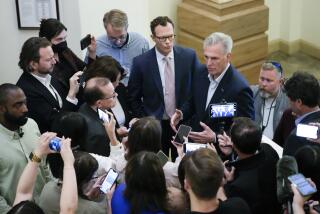World Financial Services Pact’s Prospects Dim
- Share via
An agreement to open up the world’s multitrillion-dollar global banking and insurance markets remained elusive as today’s deadline approached. Financial turmoil in Asia and political doubts in the U.S. appeared to be delaying the deal.
“We are not quite there yet, but we are poised to get that deal,” European Union trade chief Leon Brittan said Thursday. “The apple is ripening rapidly on the tree, but needs a touch more sun to fall into our lap.”
Beneath the upbeat public comments lurked serious worries that the United States might seek limits to the deal.
A World Trade Organization meeting broke up inconclusively in Geneva on Thursday, although individual negotiations between nations continued in search of a breakthrough before today’s midnight deadline.
Clinton administration representatives were meeting in Washington to discuss options. Officials in Geneva said there was still a long way to go.
Washington--and to a lesser extent the European Union--are arguing that Asian countries such as Malaysia, South Korea and India must do more to guarantee foreign access to banking and insurance markets.
The United States--which has one of the most open markets--walked away from a global accord in 1995, saying others hadn’t done enough to assure access for American companies. There is no guarantee that it won’t do the same this time.
Trade ministers from the 15-nation EU met and said they wanted a “full and permanent agreement,” a request also backed by Canada, Japan and Australia at the WTO meeting.
But no one, at least publicly, was ready to countenance the risk of a total collapse of the talks.
“Failure, I do not foresee that,” World Trade Organization chief Renato Ruggiero said.
At stake is access to as much as $1.2 trillion in daily foreign exchange transactions. In addition, the WTO estimates global insurance premiums total $2 trillion and banking assets at $20 trillion.
A rapidly growing number of foreign banks, insurance companies and securities houses operate abroad or provide services to foreign customers.
A WTO accord would boost that competition while creating a much more predictable, stable operating environment, underpinned by international rules.
Industrialized countries would be able to increase their exports of financial services and customers would have a wider choice of foreign companies. And developing countries would benefit from bigger inflows of capital and financial expertise from foreign investors, backers said.
Supporters of the WTO deal argue that if Asian countries opened up more to foreigners, this would give them a much needed boost to help stave off future economic crises.
But Malaysia, in particular, has blamed its current woes on foreign currency speculators.
Although Malaysia has put in a liberalization offer, it wants to keep limits on foreign investments.
More to Read
Sign up for Essential California
The most important California stories and recommendations in your inbox every morning.
You may occasionally receive promotional content from the Los Angeles Times.










